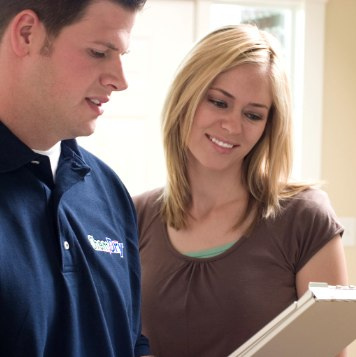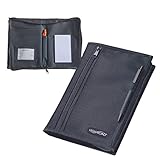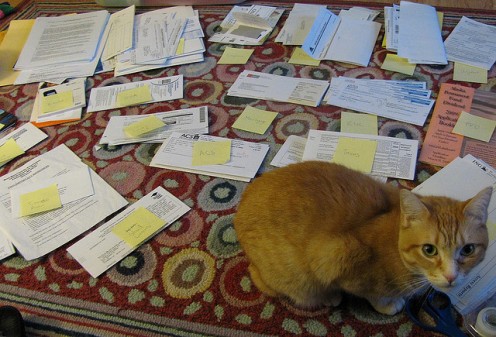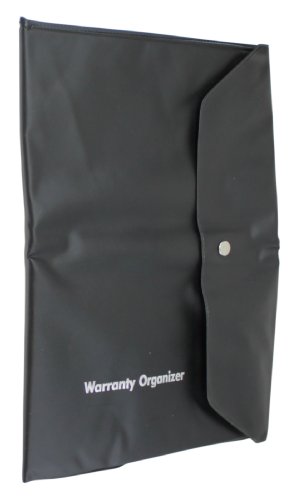Moving Checklist: Address Updates

Numerous details demand attention in a residential move. Checklists help keep you on task, and a moving checklist for updating your new address with friends, family and associates is one of the handiest to have in preparation for a move. Try these helpful tips for creating your address updates.
Moving involves so many sub-tasks, some details can easily slip through the cracks along the way. Checklists prepared in advance will help keep you on top of your relocation tasks, and a specific moving checklist for providing address updates to friends, family, businesses and personal associates is one of the most valuable to create and maintain. While the usefulness of such a checklist is most apparent at moving time, this very same list can serve well in-between moves to track household contacts. It can also help to monitor periodic schedules (such as newspaper or water deliveries) and expenditures for myriad activities, appointments, subscriptions and memberships. The address update moving checklist can prove itself to be invaluable as a household management tracking system.
Updating Your Information
Your new address can be filed with the United States Postal Service well in advance of your move date. Simply fill out a change of address form (obtainable at no charge from any U.S. post office) indicating the date mail service should begin at the new location, then drop the form off at a post office or in any U.S. mailbox. Better yet, hop online to update your data directly on the post office’s website. Either way, be sure to give notice at least two weeks in advance of your move, or your mail may not show up at your new place just as you move in. The USPS’s Change of Address service will continue to forward first-class mail for one year, and periodicals for two months.
If you're moving to an apartment or condo, be sure to include the residence's unit number in your address update notification. Take care that you forward only mail for yourself if other household members with the same last name are remaining in your old home. At the new residence, add your last name onto the physical on-site mailbox if allowed; if exterior names may not be listed, then at least place a note inside the new mailbox stating your name as the new recipient of mail for that address. Taking the brief time required to leave this note in your new mailbox where the mail carrier will be sure to see it will not only help the mail carrier, but save you from an onslaught of misdirected mail intended for previous tenants.
Update in Style
Brighten Their Day
Don’t simply email your new address to those closest to you. Instead, treat them to a taste of graceful, old-school mail with a letter providing your new address along with an update of what’s going on in your life and the reasons for the changes leading to the move. Or, if you wish to keep it simple, drop a whimsical postcard in the mailbox to send friends and family a quirky smile along with your new residential information.
Turn a chore into an honored ritual by using a favored, treasured pen for addressing these letters, or by placing monogrammed stickers on the envelope. People love finding handwritten personal messages in their mailbox in place of the usual barrage of bills and junk mail. Writing these communiques with style starts off your tenure in the new residence with respect and panache.
Of course, use more professional means of informing work or school contacts of your new residential information. Don't rely on a verbal notification; be sure to provide companies your address updates in writing.
Handwrite For a Personal Touch
Financial Institutions
Notify each bank and financial institution you do business with of your new address. Address updates should be noted for all checking and saving accounts, credit union accounts and online payment systems. Order a new set of checks reflecting your new home address as soon as you’ve signed the purchase or lease agreement, since checks can take weeks to arrive. If you have multiple credit or debit cards, check all the plastic cards in your wallet against the monthly statements you receive, and then look closely at the fine print on your statements. Those different cards in your wallet might well be issued by the same banking institution, even if the cards are imprinted with differing company logos. If so, you may be able to condense some of your address updates, effectively informing the single issuer of several cards about your new address with a single letter.
Confirm and then double-confirm whether you can update your personal data electronically, or whether you must provide written notification bearing an original signature. In some cases, failure to provide updated information in writing might breach your contract with the financial institution in question. Again, read the fine print of each card’s agreement before you act.
Don't forget to alert banks holding mortgages on rental properties or second homes you may own. Those institutions need your new address, too. Real estate agents you have enjoyed working with would also appreciate receiving address updates from you.
The Department of Motor Vehicles
Drivers are generally granted a brief period of time after their official move date to update their residential information with the DMV, with common grace periods ranging from ten to 30 days. To make the task easier, some states allow posting address updates online. Check your state’s requirements for reporting address changes, and follow those policies to ensure your license and registration information remain up-to-date.
Most automobile clubs provide a welcome alternative to heading down to the DMV for license and registration updates; take advantage of those services if you are a club member. Whichever method you follow, be sure that your moving checklist includes updating your information with the DMV, or your next minor parking ticket fee could balloon with a large penalty fee added on.
Update DMV & Insurance Documents

Insurance Companies
It is important to notify your insurance carriers of address updates as quickly as possible to keep your policies current. A new address can also to mean that adjustments in charges and level of coverages are in order. Your new residential address may result in lower (or higher) premiums for health care, automobile or renter’s insurance. If you move and don't provide current address updates with insurance companies, complications may arise when you attempt to file a claim.
When providing address updates to insurance companies, include on your moving checklist any agency which you have engaged for insurance purposes, including sports teams your kids may be on in school or through extra-curricular activities.
Clubs and Memberships
Update memberships with automobile clubs, gyms, grocery loyalty clubs and social organizations. Consider activities your kids may be involved with, such as AYSO soccer or Scouting organizations, and provide address updates to those groups, too, along with any magazine subscriptions you or your kids might be receiving. Many organizations send out related magazines or newsletters, and updating your information with the organization may be a separate task from updating your information with any affiliated publications.
Since the USPS forwards periodicals only for 60 days, giving address updates directly to such groups will help ensure your publications will continue to arrive without interruption. Ideally, provide four to six weeks' advance notice to publishers, if possible.
Remember online clubs, organizations and groups, too, as well as online shopping sites. If you order items from auction sites and online retailers, you want to be sure your merchandise is delivered to your new address, and not sent to your former residence.
Online Registrations
People spend a great deal of time online, and a lot of real life is initiated by an online registration somewhere in the world wide web. Since some online registrations require maintaining a current physical address on file, check your bookmarked URLs and your history of often-visited sites. Review the terms and conditions of sites you have registered with, and provide address updates where required by the terms of service, or for any site you wish to have your physical address.
Address Updates for All Contacts
Health & Wellness
| Education
| Recreation
|
|---|---|---|
Gym membership
| Colleges & universities
| Kids'/adult sports clubs/teams
|
Spas & beauty parlors
| Trade or business school
| Periodical subscriptions
|
Medical practitioners
| Continuing education
| Service clubs and charities
|
Chiropractors, dentists
| Student loans
| Scouting organizations
|
Strength & aerobics classes
| Grant/Scholarship applications
| 4H Club, choirs, book clubs
|
Fitness trainer
| Alumni association
| Grocery & other loyalty clubs
|
Your moving checklist should note address updates for all contacts you interact with more than once. This list is a sample to spur your own thoughts of who to notify.
Utilities, Television and Internet
Before moving from your old residence, contact service providers to close out all utility accounts in your name on a specified move-out date. Failure to do so could result in your being liable for utility usage after you’ve vacated your previous home. If you're moving from a rental, check first with your landlord to determine whether the owner wants the utilities turned off, or left on with services transferred into the homeowner’s name. Make these arrangements a few weeks ahead of moving day to avoid any surprises at the last moment.
Also check in advance with any cable, satellite or fiber optic companies you subscribe through to determine the status of any contractual agreements you may have with each company. Closing service prior to a contract’s end date may result in extra charges that you will want to be prepared for. If your new residence is served by the same provider(s), see if you can continue your existing account, but simply transfer it--and your existing contract--over to the new address.
Moving is an excellent opportunity to perform a little research and see if you can negotiate better rates for your phone, television and internet services. Companies often offer new area residents a special "welcome to town" type of offer, so it really can pay to check around.
Organize and Conquer

Organize Your Life

Brainstorm for More
Think of people you contact seasonally or only occasionally throughout the year. Individuals, businesses and agencies that you seldom contact are the easiest to overlook when creating your checklist.
Start an ongoing list using your incoming mail as an address data source. Some contacts you may want to keep in touch with are people with whom you may never initiate communications, but who send you mail on a regular or semi-regular basis (alumni associations or trade newsletters, for example).
Check your past year’s calendar and review who you contacted about what throughout the previous twelve months. This method may jog your memory to provide address updates with a veterinarian, mechanic or that charity you volunteer with once a year. Through this review process, you may even rediscover a long-lost friend you’ve fallen out of contact with.
Once all your research is completed, compile all your notes and gather them into an organized fashion, so that the aggregated information will be ready at your fingertips the next time you move.
© M.S. Ross - All Rights Reserved
Other Contacts to Update
What other individuals or organizations should be on your moving checklist to receive address updates? Can you think of contacts not mentioned here that sometimes get left out of the loop?









